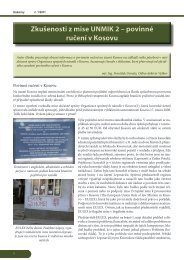TRADOC Pam 525-3-7-01 - TRADOC - U.S. Army
TRADOC Pam 525-3-7-01 - TRADOC - U.S. Army
TRADOC Pam 525-3-7-01 - TRADOC - U.S. Army
- No tags were found...
Create successful ePaper yourself
Turn your PDF publications into a flip-book with our unique Google optimized e-Paper software.
<strong>TRADOC</strong> <strong>Pam</strong> <strong>525</strong>-3-7-<strong>01</strong> Officer and NCO professional education at all levels must have the capability to deliverprogressive and sequential content on those leadership skills that develops and sustainsthe warrior spirit, Soldier moral, and unit cohesion, and prevents COSR casualties. Mentorship relationships should give proper ethical modeling high priority as an essentialelement without neglecting the criticality of technical competence, which, in fact, is a keyvirtue of all in service. Leader evaluation must be capable of assessing individual modeling of declaredinstitutional values and virtues. Professional education experiences must involve formal and mentored opportunities toreflect on individual ethical development and the importance of the leader’s role increating an ethical climate in which subordinates can act ethically and develop their moralidentity. Officer and NCO professional education must include progressive and sequential contenton cultural literacy through cultural competency; specifically understanding key groupscapable of influencing military operations in the immediate and broad sense; groups likethe press, nongovernmental and other governmental agencies, and the American andforeign publics. This must include negotiation skills. The <strong>Army</strong> must develop a broad, sequential, and progressive program of institutional andself-development language learning with the goal of attaining a high level of fluency intargeted positions, at least a moderate expertise in all mid-level commissioned, and NOCleaders. This will include a combination of <strong>Army</strong> schools and advanced civilianeducation. The <strong>Army</strong> must have the capability to identify those applicants with obviouspsychological factors that should eliminate them from military service. The <strong>Army</strong> must maintain standards for recruitment that avoid accession of recruits andofficer cadets/candidates with demonstrated, significant behavior problems. <strong>Army</strong> recruiting programs must make clear the warrior purpose of uniformed service andthe moral-ethical expectations placed on members. <strong>Army</strong> must have the capability to enlist, commission, and manage linguists in targetedlanguages, and integrate language and culture training within other training events. Future Modular Force commanders require the facilities at home station and in the AOthat positively affect Soldier morale (such as, Department of Family and Children'sServices, morale, welfare, and recreation services, Soldier living quarters, training andmaintenance facilities, family housing, force protection, and health care). The <strong>Army</strong> must capitalize on its experience reintegrating Soldiers who have sufferedtraumatic injury or psychological harm in <strong>Army</strong> units and civilian life by developingprograms deliberately designed to meet Soldier reset requirements. Future Modular Force commanders require facilities at home station and the CTCs thatwill replicate the cultural landscape within which their units will likely operate. Regardless of its role within the spectrum of conflict, the <strong>Army</strong> requires a capability toreestablish—or introduce—the rule of law, operate and administer a corrections systemfor offenders pending criminal proceedings, and enable the advent of a functioningjudicial system that adjudicates individual cases for final disposition.82



